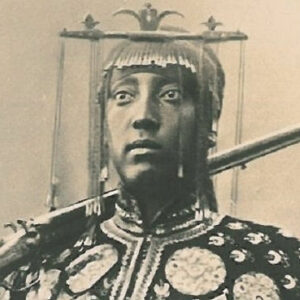Menelik II was the Emperor of Ethiopia (1889–1913) and the King of Shewa (1865–89). He was one of the most popular kings to rule the African nation, embarking on major expansion activities that culminated to the establishment of a modern empire-state by 1898. He was a brave and valiant warrior who led his army to fight an Italian invasion attempt, earning him tremendous reputation and glory. Menelik was the son of the King of Shewa, Haile Melekot, and a court worker. His grandfather deemed him a legal successor despite the fact that his parents were not married at the time of his birth. From the 17th century, his predecessors had ruled over the kingdom of Shewa. When Menelik was a small boy, his father was killed in a fight, and Menelik was kidnapped by the enemies. He eventually managed to flee and return to his homeland, which had been taken over by Bezebeh since then. Menelik, a bold young man, defeated Bezebeh and took control of the kingdom that was rightly his. He earned a reputation for repelling Italian invaders and expanded his territory over time. He was also noted for modernizing Ethiopia and was seen as a just and compassionate ruler.
Childhood and Adolescence
Menelik II was born in Angolalla, Shewa, on August 17, 1844, as Sahle Maryam. Haile Melekot was the Negus (King) of Shewa, and his mother, Woizero Ijigayehu, was a servant in Haile Melekot’s grandmother’s home, Woizero Zenebework.
His parents were not married at the time of his birth, but they later married. Despite the fact that the boy was born out of wedlock, his grandpa had him legitimized, and Haile Melekot named him the heir to the Shewa kingdom.
Tewodros II, Ethiopia’s Emperor, conquered the kingdom of Shewa in 1855. Menelik was captured and carried to Tewodros II’s mountain stronghold of Magdala after Haile Melekot perished in one of the early fights. The little prince was only 11 years old at the time.
Tewodros was kind to the prince. He took a keen interest in his schooling, ensuring that he received martial arts training as well as political knowledge. The kid was even elevated to the rank of dejazmach, or earl, and was promised the emperor’s daughter, Altash, in marriage.
Meanwhile, Tewodros II had chosen Menelik’s uncle, Haile Mikael, as Meridazmach (“Supreme General”) of Shewa. Haile Mikael, on the other hand, rebelled against the Emperor and was replaced by Bezebeh. He, too, defied the Emperor and declared himself Emperor Negus of Shewa.
Reign & Ascension of Menelik II
Menelik was finally able to escape Tewodros II’s captivity in July 1865, after ten years in his captivity. He was a strong, well-built, and courageous young man, now 21 years old, who was resolved to retake the throne of Shewa that was rightly his.
Bezebeh attempted to assemble an army against Menelik when he returned to Shewa. Menelik, on the other hand, had widespread public backing and declared himself Negus.
He raised his ambitions after capturing Shewa and claimed the imperial crown. For as long as Emperor Tewodros was alive, he did not take any overt action. When Tewodros died in 1868, Menelik began to take steps to establish his claim to the throne.
Menelik was not the only one who wanted to be king. Yohannes IV, a powerful Ethiopian prince, also vied for the emperorship and succeeded in becoming Ethiopia’s Emperor in 1871.
Meanwhile, Menelik concentrated his efforts on expanding his lands to the south and east. He conquered Arusi, Harer (Harar), Jima, Kefa (Kaffa), and several other kingdoms in southern Ethiopia, greatly expanding his territory.
At March 1889, Emperor Yohannes was killed in the Battle of Gallabat, allowing Menelik to gain the throne he so sorely desired. Menelik acted quickly, and on November 3, 1889, he was crowned Emperor Negus Negast (King of Kings).
On May 2, 1889, Menelik signed the Treaty of Wuchale with the Italians, relinquishing Eritrea’s northern province to Italy. However, there was some dispute about the interpretation of one of the treaty’s articles: the Italian version declared Ethiopia to be a protectorate of Italy, while the Ethiopian version contained no evidence to back this assertion.
Menelik rejected the entire contract in 1893 and launched an attack on the Italians who had colonized the Red Sea coast. Over the years, the Italians and Ethiopians fought several little conflicts, culminating in the momentous Battle of Adwa (1896), in which the Ethiopians beat the Italians.
Menelik was considered as a powerful political force by European nations following the decisive victory at the Battle of Adwa, and the victory also made the emperor an internationally renowned personality.
Battles of Importance
Menelik is well renowned for his bravery in the Battle of Adwa, which took place in March 1896 between Ethiopian and Italian forces. The Ethiopians soundly beat the Italians who wanted to invade Ethiopian territory and establish their own African empire. It was the colonial era’s first major defeat of a European power by African forces.
Personal History and Legacy
Menelik II married three times. In 1864, he married Altash Tewodros for the first time. In 1865, the short-lived marriage came to an end.
In 1865, he married for the second time. Befana Gatchew was his second wife, whom he divorced in 1882.
In 1883, he married Taytu Betul, an Imperial noblewoman.
Menelik had several natural offspring, including Shoaregga Menelik, Zauditu Menelik, and Asfa Wossen Menelik, whom he recognized.
From 1906 forward, the Emperor experienced a series of seizures. His health deteriorated over time, and Taytu Betul ruled on his behalf while he was unwell.
After years of failing health, he died on December 12, 1913. For a few years, Ethiopia was ruled by regents before his oldest daughter Zewditu I succeeded him in 1916.
Estimated Net Worth
Menelik is one of the wealthiest Emperors and one of the most popular. Menelik II’s net worth is estimated to be $1.5 million, according to Wikipedia, Forbes, and Business Insider.


